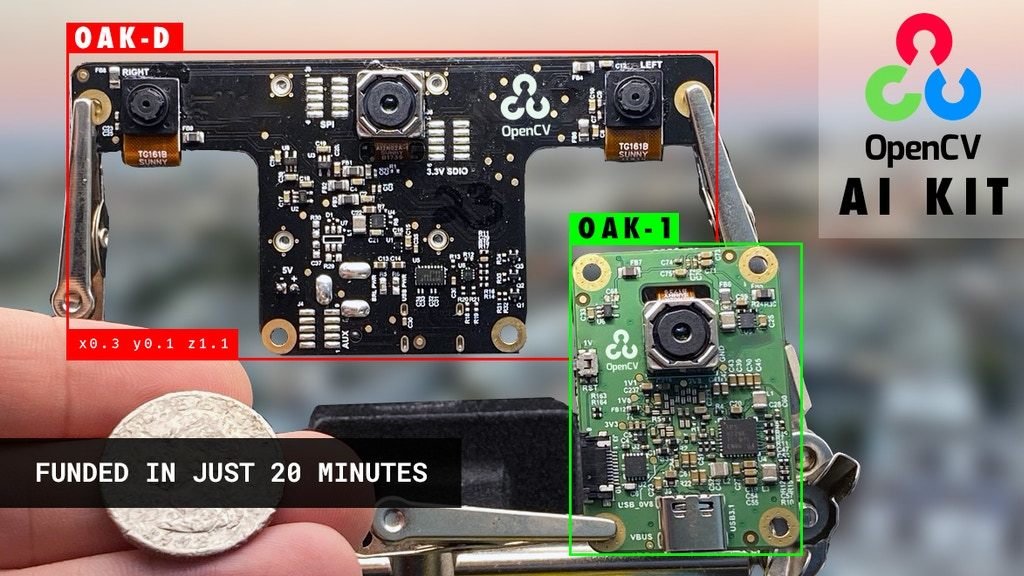Community Friday #2 - The Power of Myriad X, Community Spotlight
over 5 years ago
– Sun, Aug 02, 2020 at 09:46:06 AM
It’s Friday, and everybody’s working for the weekend but us. In case you missed this week’s updates, we announced ROS 1 + ROS 2 compatibility and support for MicroPython, introduced a new reward level, and showed off our hard synchronization between neural inference and spatial data plus a whole lot more in each of those updates. If there’s anything you’d like to see more detail about, let us know in the comments of this post.
Community Spotlight: PyImageSearch

If you’re new to computer vision you may recognize Adrian Rosebrock, PhD from their interview with OAK Chief Architect Brandon Gilles, but if you’re already a CV enthusiast you recognized the owner of PyImageSearch, likely because you’re one of the tens of thousands who took your first steps with computer vision or deep learning on that very website.
In addition to the vast, totally free, tutorials available on the blog (new ones are published every Monday at 10AM EST), PyImageSearch also offers some great, affordably-priced, books and courses covering Computer Vision, Deep Learning, and of course OpenCV. Now is a great time to brush up while we wait for units to ship in December...
Stretch Goal Update: Less Than $75k to go!

Just 12 days left in the campaign, and it’s been a whirlwind but there’s no time to slow down just yet. Thanks to your new pledges, pledge increases, and social media traffic we’re just $75,000 away from the $750,000 goal which unlocks an open source PoE variant of OAK-D. We can do it!
OAK 101: Visual Processing Power
We’ve gotten a lot of questions about the raw capabilities of OAK’s AI processing power. The backbone of OAK is the Intel Movidius Myriad X VPU. This low-power Visual Processing Unit is tons of hell yeah crammed into a 8-millimeter rectangle of spatial computing bliss.

You can find more information on Myriad X in Intel’s handy dandy product brief. Without this awesome chip, it's possible that OAK would be just another hobbyist camera module. With it, we’re able to offer the game-changing OAK modules we have today, which will be in backer’s hands in December.
Reddit AMA and T-Shirt Reveal - Tuesday, August 4th 12:30pm PDT
Come one, come all, community members! We hope to see you in our Reddit AMA on Tuesday as mentioned in yesterday’s update. Our friends at OpenVINO just finished one of their own on /r/intel, you should check it out. If ours goes well, maybe we’ll do another one in a different time zone. Bring your questions, bring your comments, bring your just-saying-hey. It’ll be a good time with Satya and Brandon.

We’ll also be revealing the OAK campaign t-shirt on Tuesday. Existing backers can add $20 to their pledge now to make sure they get one, and if you want the shirt but can’t pledge for a hardware modules, just pledge $20 and you’ll be able to get one once the campaign ends. If you want more than one just add $20 times the number of shirts you want. We'll collect size info in the backer management system after the campaign.
OpenCV Spatial AI Competition Spotlight: At Home Work-out Assistance Device
Keeping good form during exercise is difficult even under the best circumstances, and without supervision it’s easy to train incorrectly, leading to an injury. When working out at home, you've rarely got someone to spot you. With a global pandemic forcing more and more people to exercise away from others, these at-home workouts are booming.
Daniel Rodriguez Prezzo, Gustavo Camargo Rocha Lima, Natalia Souza Soares, and Victory Gouveia De Menezes Lyra, a group of undergraduate students at Federal University of Pernambuco in Brazil have set out to improve both the experience of these at-home workouts by using AI to monitor the form of the participants and detect + instruct them when their form is incorrect or dangerous.
The project is intended to be an upgrade of an existing Microsoft Kinect-based project, called IKapp, as seen in the video above. OAK-D and a smartphone app will be used in place of a Kinect and a PC. According to the project brief, they’ll be using captured data of poses provided by specialists to train the upgraded system.
We wish this project the best of luck in Phase 2. Improving the efficiency of exercise and preventing injuries is a great use of OAK to improve lives, and using OAK-D with ubiquitous smartphones is a cool twist. You can find the full list of Phase 1 winners on the blog.
Poll: Which project should we cover next week?
Just like last Friday, we chose 5 projects at random, and you get to vote on who we share more detail about next week. You can vote in the new poll starting now!
—
That’s all for this week, backers! We will see you next week with another batch of OAK-y goodness Monday through Friday. Who knows, we might even drop something this weekend…
